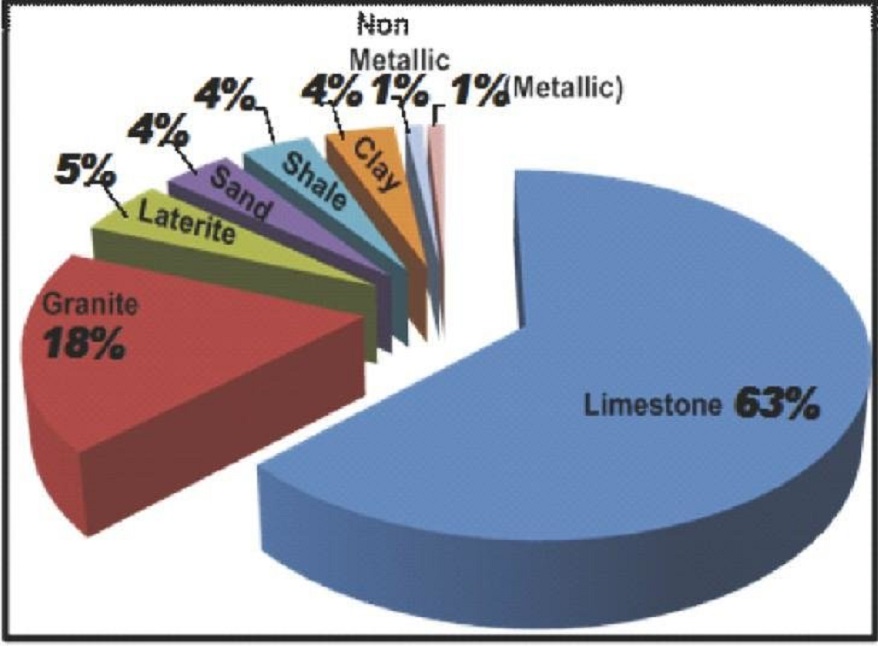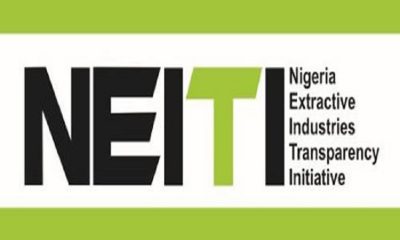Economy
Nigeria Generates N814.59bn from Solid Minerals in 14 Years

By Adedapo Adesanya
Nigeria generated N814.59 billion between 2007 and 2021 from the solid minerals sector, with the 2021 earnings of N193.59 billion being the highest in the period under review.
This was disclosed by the Nigeria Extractive Industries Transparency Initiative (NEITI) in its 2021 Solid Minerals Industry Report, tagged Impact Built on Blocking Leakages to Grow Revenue’ unveiled by the Secretary to the Government of the Federation (SGF), Mr George Akume, represented by Mr Maurice Mbaeri, Permanent Secretary, General Services Office.
The report, the 12th in the series, covers actual payments by 1,214 companies operating in the sector and receipts from three key government agencies.
It covers the quantities of minerals produced, utilised and exported from the sector, reconciles the physical/financial transactions and undertakes special verification on some processes.
Presenting the report, Mr Orji Ogbonnaya Orji, Executive Secretary, NEITI, said the figure showed an increase of N60.32 billion or 51.89 per cent growth compared to the 2020 revenue flows of N116.82 billion.
This positive trend, he said, reflected a continuation of the upward positive trajectory observed in the sector over the past five years.
“This contribution, though a significant increase over past years, is still abysmal considering the potentials of the sector to the Nigerian economy,” he said.
Mr Orji said the 2021 Solid Minerals report reviewed, ascertained, reconciled and reported all revenues and investment flows to and from the government in the solid minerals sector.
He said the NEITI report also covered balances payable/receivable from financial inflows, tracked the funds and utilisation meant for the development of solid minerals in Nigeria.
According to Mr Orji, the funds include the Natural Resources Development Fund, Solid Minerals Development Fund, Ministry of Mines and Steel Development’s MinDiver Programme and Solid Minerals Development Funds under the Small and Medium Industries Equity Investment Scheme operated through the Bank of Industry.
A breakdown of the revenues showed that the Federal Inland Revenue Service collected N169.52 billion, the Mining Cadastre Office generated N4.3 billion, and the Mining Inspectorate Department generated N3.62 billion.
He said the revenue to the federation accounts from the sector in the past 15 years, which was N818.04 billion, was significantly low compared to the sector’s economic potential.
On Production, Mr Orji said the report disclosed that the total volume of solid minerals used or sold in 2021 was 76.28 million tons with a royalty payment of N3.57 billion.
“The minerals with the largest production volume in the year under review are granite, limestone, laterite, clay and sand.
“Dangote Plc accounted for the highest production with a total production of 28.8 million tons. Bua and Lafarge accounted for 8.4 and 4.3 million tons, while Zeberced accounted for 3.3 million tons, respectively.
“Ogun state recorded the highest production in the year under review, with a total of 17.5 million tons, followed by Kogi state with 16.3 million tons and Edo with 8 million tons.
“The least production volume was recorded in Borno State with 25,500 tons,” he said.
The NEITI boss said a total of 2,045 licenses were issued, with exploration licenses accounting for 840 (an increase of 62.79 per cent), Small Scale Mining Leases at 771, Quarry Lease at 255, Reconnaissance Permit at 139 and Mining leases at 40.
On export, he said the total minerals exported in 2021 was 142.54 million tons with a Free on Board value of $101.29 million, an increase of 138.57 per cent from the $42.46 million reported in the 2020 report.
He said China was identified as the principal destination of Nigeria’s mineral exports, accounting for 97 per cent and 88 per cent of the export volume and value while other destinations for Nigeria’s minerals included Malaysia, Korea, Thailand and the United Arab Emirates.
On solid minerals’ contribution to the economy, he said the report revealed that the sector contributed 0.63 per cent to Gross Domestic Product (GDP), while there was an improvement compared to previous years, where it contributed 0.45 per cent in 2020 and 0.26 per cent in 2019.
According to him, the sector has not yet reached its full potential in making a significant impact on the overall Nigerian economy.
He identified a total of N1.06 billion as outstanding company liability to the government within the period under review as a result of the failure of some companies to pay their annual service fees for the respective mineral titles. The annual service fee is a statutory payment by mineral title holders for each cadastral unit on mineral titles.
Economy
Tinubu Okays Extension of Ban on Raw Shea Nut Export by One Year

By Aduragbemi Omiyale
The ban on the export of raw shea nuts from Nigeria has been extended by one year by President Bola Tinubu.
A statement from the Special Adviser to the President on Information and Strategy, Mr Bayo Onanuga, on Wednesday disclosed that the ban is now till February 25, 2027.
It was emphasised that this decision underscores the administration’s commitment to advancing industrial development, strengthening domestic value addition, and supporting the objectives of the Renewed Hope Agenda.
The ban aims to deepen processing capacity within Nigeria, enhance livelihoods in shea-producing communities, and promote the growth of Nigerian exports anchored on value-added products, the statement noted.
To further these objectives, President Tinubu has authorised the two Ministers of the Federal Ministry of Industry, Trade and Investment, and the Presidential Food Security Coordination Unit (PFSCU), to coordinate the implementation of a unified, evidence-based national framework that aligns industrialisation, trade, and investment priorities across the shea nut value chain.
He also approved the adoption of an export framework established by the Nigerian Commodity Exchange (NCX) and the withdrawal of all waivers allowing the direct export of raw shea nuts.
The President directed that any excess supply of raw shea nuts should be exported exclusively through the NCX framework, in accordance with the approved guidelines.
Additionally, he directed the Federal Ministry of Finance to provide access to a dedicated NESS Support Window to enable the Federal Ministry of Industry, Trade and Investment to pilot a Livelihood Finance Mechanism to strengthen production and processing capacity.
Shea nuts, the oil-rich fruits from the shea tree common in the Savanna belt of Nigeria, are the raw material for shea butter, renowned for its moisturising, anti-inflammatory, and antioxidant properties. The extracted butter is a principal ingredient in cosmetics for skin and hair, as well as in edible cooking oil. The Federal Government encourages processing shea nuts into butter locally, as butter fetches between 10 and 20 times the price of the raw nuts.
The federal government said it remains committed to policies that promote inclusive growth, local manufacturing and position Nigeria as a competitive participant in global agricultural value chains.
Economy
NASD Bourse Rebounds as Unlisted Security Index Rises 1.27%

By Adedapo Adesanya
The NASD Over-the-Counter (OTC) Securities Exchange expanded for the first session this week by 1.27 per cent on Wednesday, February 25.
This lifted the NASD Unlisted Security Index (NSI) above 4,000 points, with a 50.45-point addition to close at 4,025.25 points compared with the previous day’s 3,974.80 points, as the market capitalisation added N30.19 billion to close at N2.408 trillion versus Tuesday’s N2.378 trillion.
At the trading session, FrieslandCampina Wamco Nigeria Plc grew by N5.00 to trade at N100.00 per share compared with the previous day’s N95.00 per share, Central Securities Clearing System (CSCS) Plc improved by N4.18 to sell at N70.00 per unit versus N65.82 per unit, and First Trust Mortgage Bank Plc increased by 14 Kobo to trade at N1.59 per share compared with the previous day’s N1.45 per share.
However, the share price of Geo-Fluids Plc depreciated by 27 Kobo at midweek to close at N3.27 per unit, in contrast to the N3.30 per unit it was transacted a day earlier.
At the midweek session, the volume of securities went down by 25.3 per cent to 8.7 million units from 11.6 million units, the value of securities decreased by 92.5 per cent to N80.7 million from N1.2 billion, and the number of deals slipped by 33.3 per cent to 32 deals from the preceding session’s 48 deals.
At the close of business, CSCS Plc remained the most traded stock by value on a year-to-date basis with 34.1 million units exchanged for N2.0 billion, trailed by Okitipupa Plc with 6.3 million units traded for N1.1 billion, and Geo-Fluids Plc with 122.0 million units valued at N478.0 million.
Resourcery Plc ended the trading session as the most traded stock by volume on a year-to-date basis with 1.05 billion units valued at N408.7 million, followed by Geo-Fluids Plc with 122.0 million units sold for N478.0 million, and CSCS Plc with 34.1 million units worth N2.0 billion.
Economy
Investors Lose N73bn as Bears Tighten Grip on Stock Exchange

By Dipo Olowookere
The bears consolidated their dominance on the Nigerian Exchange (NGX) Limited on Wednesday, inflicting an additional 0.09 per cent cut on the market.
At midweek, the market capitalisation of the domestic stock exchange went down by N73 billion to N124.754 trillion from the preceding day’s N124.827 trillion, and the All-Share Index (ASI) slipped by 114.32 points to 194,370.20 points from 194,484.52 points.
A look at the sectoral performance showed that only the consumer goods index closed in green, gaining 1.19 per cent due to buying pressure.
However, sustained profit-taking weakened the insurance space by 3.79 per cent, the banking index slumped by 2.07 per cent, the energy counter went down by 0.24 per cent, and the industrial goods sector shrank by 0.22 per cent.
Business Post reports that 25 equities ended on the gainers’ chart, and 54 equities finished on the losers’ table, representing a negative market breadth index and weak investor sentiment.
RT Briscoe lost 10.00 per cent to sell for N10.35, ABC Transport crashed by 10.00 per cent to N6.75, SAHCO depreciated by 9.98 per cent to N139.35, Haldane McCall gave up 9.93 per cent to trade at N3.99, and Vitafoam Nigeria decreased by 9.93 per cent to N112.50.
Conversely, Jaiz Bank gained 9.95 per cent to settle at N14.03, Okomu Oil appreciated by 9.93 per cent to N1,765.00, Trans-nationwide Express chalked up 9.77 per cent to close at N2.36, Fortis Global Insurance moved up by 9.72 per cent to 79 Kobo, and Champion Breweries rose by 5.39 per cent to N17.60.
Yesterday, 1.4 billion shares worth N46.2 billion were transacted in 70,222 deals compared with the 1.1 billion shares valued at N53.4 billion traded in 72,218 deals a day earlier, implying a rise in the trading volume by 27.27 per cent, and a decline in the trading value and number of deals by 13.48 per cent and 2.76 per cent, respectively.
Fortis Global Insurance ended the session as the busiest stock after trading 193.7 million units for N152.7 million, Zenith Bank transacted 120.7 million units worth N11.1 billion, Japaul exchanged 114.8 million units valued at N407.0 million, Ellah Lakes sold 98.4 million units worth N999.2 million, and Access Holdings traded 63.1 million units valued at N1.7 billion.
-

 Feature/OPED6 years ago
Feature/OPED6 years agoDavos was Different this year
-
Travel/Tourism10 years ago
Lagos Seals Western Lodge Hotel In Ikorodu
-

 Showbiz3 years ago
Showbiz3 years agoEstranged Lover Releases Videos of Empress Njamah Bathing
-

 Banking8 years ago
Banking8 years agoSort Codes of GTBank Branches in Nigeria
-

 Economy3 years ago
Economy3 years agoSubsidy Removal: CNG at N130 Per Litre Cheaper Than Petrol—IPMAN
-

 Banking3 years ago
Banking3 years agoSort Codes of UBA Branches in Nigeria
-

 Banking3 years ago
Banking3 years agoFirst Bank Announces Planned Downtime
-

 Sports3 years ago
Sports3 years agoHighest Paid Nigerian Footballer – How Much Do Nigerian Footballers Earn



















